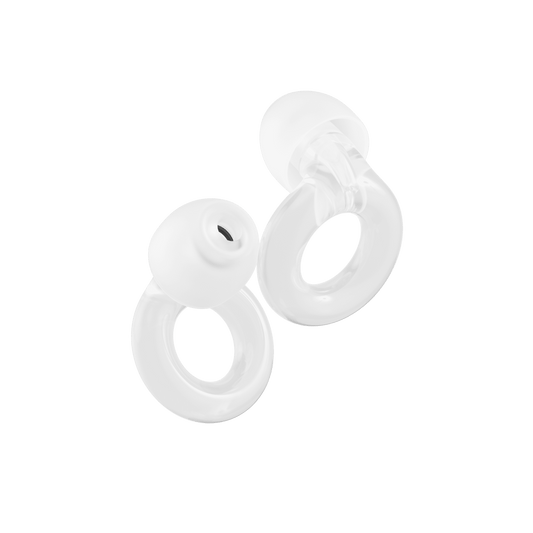Feel a sudden urge to leave the room? Avoiding the next family gathering? Can’t concentrate at work? You may not even have realized it, but you could be suffering from noise sensitivity in one form or another. As someone with autism I know why my ears are sensitive to noise, but a lot of people with sensitive hearing due to conditions like hyperacusis or phonophobia may not have connected the dots yet.
Below are a number of things that can point to a sensitivity to sound.
#1 Always zoning out or leaving the room? Your ears are sensitive to noise, my friend!
Do you sometimes suddenly feel that you absolutely have to leave the room for a few? Maybe you step outside for a bit, or you find a room to hide out in for some peace and quiet. Others may stay put, but have a tendency to zone out: they kind of disassociate themselves from their environment and retreat inwards. They may be able to pretend they are reasonable with it, but would be hard-pressed to hold an actual conversation. While others think they’re being aloof, they are just too overwhelmed by their noise sensitivity to focus on what’s going on. Sound familiar?
Happy Loopers - Reduce your noise sensitivity
#2 Suffer from headaches or migraines? You may suffer from phonophobia
Phonophobia simply means an intolerance or hypersensitivity to sound,or a fear of loud noises. People who suffer from phonophobia can experience feelings of panic or discomfort in reaction to even moderately loud sounds. It’s one of the most common symptoms experienced by migraine sufferers. Certain noises can cause extreme discomfort while migraines are building up and during attacks. But even people who don’t suffer from migraines can experience stress headaches in reaction to sound, if they are sensitive to noise.
#3 Are there certain movements or gestures that calm you down? Maybe it’s sensitive hearing


If you have ears sensitive to noise, certain movements or gestures can provide temporary relief. As a person on the spectrum I’m very familiar with a certain behavior called “stimming.” After all, autism often goes hand in hand with noise sensitivity.
Auditory stimming can take the form of humming, grunting, tapping on objects or ears, and finger-snapping, among others.
But you can also rely more on movement, for example by grinding your teeth, drawing your shoulders up, or opening and closing your fists. This helps draw attention away from sensory overwhelm and can give comfort to people with noise sensitivity, especially if they have autism.
#4 Avoiding social situations & get-togethers? Could be hyperacusis
Did you turn down the last invitation for happy hour with colleagues or your friend’s birthday party? Don’t blame it on antisocial tendencies right off the bat.
It could be sensitivity to sound in one form or another, for example hyperacusis. A lot of people just can’t deal with being in a crowded situation with people who love to raise their voices. Especially if they have to travel far to visit people and stay with them and then can’t get away.
Perhaps you find that it’s just not worth it because you end up being super irritable with everyone. No, this doesn’t necessarily mean you don’t like people: it could just be a fear of loud noises.
#5 Having a hard time focusing? Perhaps your ears are sensitive to loud noises


Did being forced to work at home during the pandemic actually come as a big relief to you? Are open plan offices your worst nightmare?
You may be able to put it down to sensitive ears. Some people are fine with a lot of background noise when they’re working, while others can’t stand it.
If you feel like you can’t concentrate on your work or lose your focus in busy or loud environments, it could be that you’re sensitive to loud noises.
#6 People either yelling or whispering make you go nuts? You might suffer from misophonia
A lot of people think that noise sensitivity means you can’t handle high volumes, but it can be about more than that. Some people can be heavily triggered by certain soft sounds too.
Someone leaning over to softly whisper in their ear or soft chewing can give people with misophonia a serious case of the heebie-jeebies. And people with phonophobia can have extreme nervous reactions to sounds in a range of volumes, from clanking pans to crackling plastic bags.
So if you’re wondering,“why am I so sensitive to noisethat can’t actually damage my eardrums?” perhaps it’s a form of noise sensitivity.
#7 Feel more comfortable wearing headphones, anywhere you go? That could be noise sensitivity
Are you someone who’s headphones are just about fused to your head? Whether you’re at work, the supermarket, or walking down the street? I totally get it, because as someone with autism I’m extremely sensitive to sound. For me it feels safer to pop in my Loop Earplugs or noise canceling headphones when I go outside!
So if you feel the need to filter out sound one way or another, guess what: it could be noisesensitivity.









































